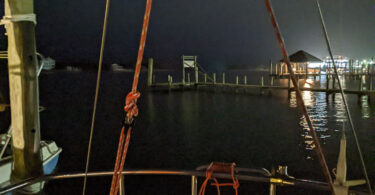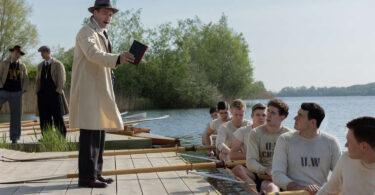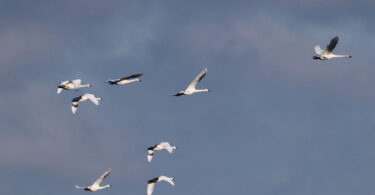Chris Maroldy
A lot has changed at Jordan Lake since 1979, when Vossie Horton of Pittsboro and his nephew John Arthurs opened the Wilsonville General store on Highway 64 at the major crossroads close by what was not quite yet the shores.
Like what? “Traffic,” Arthurs deadpans when asked about the biggest changes. “Probably traffic.”
What used to be a pretty sleepy area 40 years ago is no longer, and the crusher run and oiled dirt roads of this part of Chatham County are now all paved. They carry a steady stream of residential, commercial and recreational traffic from the surrounding towns and cities, and from all the new homes that have popped up in what used to be big woods and small farms and fields.
It has its good side and its down side, says Arthurs, 65, citing all the money generated for the state and the economy.
Vossie Horton turned 82 in March, so much of his life and most of John’s was dedicated to the store, and it came as big news in the area when they decided to retire. Vossie recalls the last day they were open was Feb. 27.
He also remembers opening for business in November ‘79, the month 500 Iranian students loyal to Ayatollah Khomeini seized the American embassy, holding 90 hostages for 444 days. (It’s also the month Ronald Reagan announced he was running for President and the month Pink Floyd released The Wall.)
Not that any of that came up in conversation when I spoke with him, but Vossie did remind me of an old T-shirt I had almost completely forgotten. Apparently, it was Vossie’s inspiration. You saw it around for a while back in the day: a graphic of a Jeep pulling a “waterskier” behind, with the slogan something like “You’ll never drown at Jordan Lake,” a reference to how long it was taking to get to the point where there was going to be any water in it.
“It was delays, delays, delays,” recalls Vossie, adding that business was very slow in the first few years as the project moved at a snail’s pace all around him. Finally—construction having begun in 1967—the Corps of Engineers closed the gates of the dam and the lake began to fill, reaching full pool in February 1982.
Back then, there was virtually no opportunity to camp (legally) around the lake, and Vossie noted that the now-numerous opportunities are a great improvement over the old days.
I’d note that a lot of good public hunting land was lost to make room for those campgrounds and state park land, but Vossie makes the point that more and better camping options are a boon to visitors who would otherwise have to spend a lot more money on hotels and motels (of which they are none in the immediate area).
He and John both feel the fishing has remained good at the lake, noting that the lake has gone through cycles. When it was first flooded, lots of standing timber and submerged cover and structure created a bonanza for fish and fishermen, and a healthy shad population and nutrient-rich waters kept Jordan gamefish fat and happy. (There’s a reason people call B. Everett bass “Jordan footballs.”)
So the lake went through its hundred-fish-a-day phase and its big-fish phases for several species, as most new impoundments do. And it has gone through some fish kills. But things always seem to have evened out and bounced back eventually, and it has always been a good fishing lake for something, and usually for more than one something at a time.
While the great fun of fishing for hybrid (Bodie) bass at Jordan is history since the NC Wildlife Resources Commission rethought its stocking strategy, most other fisheries seem to be holding up well. Striped bass might be the exception, but good crappie, bass and catfish angling prop up the lake’s reputation. The white bass fishery is being given a needed boost with tighter creel and size regulations effective the past few years, and maybe with some TLC it will become a bigger draw to the lake in the future, perhaps even taking some pressure off the crappie and the bass.
Speaking of which, Jordan probably benefits from having Shearon Harris Lake just down the road, and Falls Lake within a reasonable drive, as both lakes are first-class fishing holes and undoubtedly draw some pressure away from Jordan. At about 14,000 acres, Jordan is a pretty small, pretty narrow lake.
Heavy boat traffic and fishing pressure can take their toll on fish and fisherman.
Vossie told me that at 14,000 acres, a man could still find a spot to himself, and who am I to argue? Certainly that’s true during the week, and he and his nephew were out there at the store most days for more than four decades. They know the territory. They’ve seen a lot and heard a lot, and earned a prominent place in Jordan Lake history. They’re up there at least with Francis Cypert, who built a bridge across the difficult New Hope River and a road and a tavern to go with it all in the late 1700s.
Back then, the undeveloped, rugged New Hope valley was a significant barrier to trade and travel east and west in the colony. Heavy traffic or finding some elbow room wasn’t an issue, but getting across the rivers and steep-sided creeks certainly was. Cypert took care of that, so you might say that the traffic changes that John Arthurs noted have an identifiable culprit.
Now, while whatever might have remained of Cypert’s tavern and bridge is under the lapping waters of Jordan Lake, his road became Highway 64, home of the Wilsonville General Store and second home to John and his uncle Vossie, so it’s all good.






